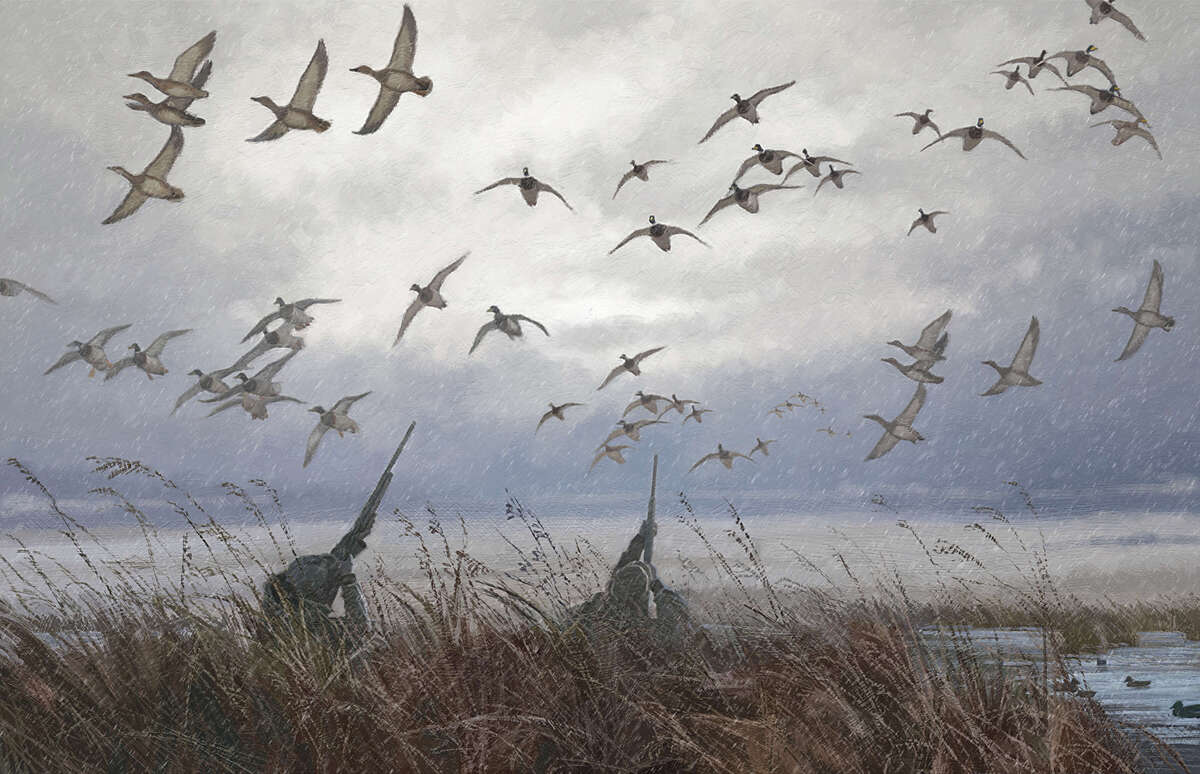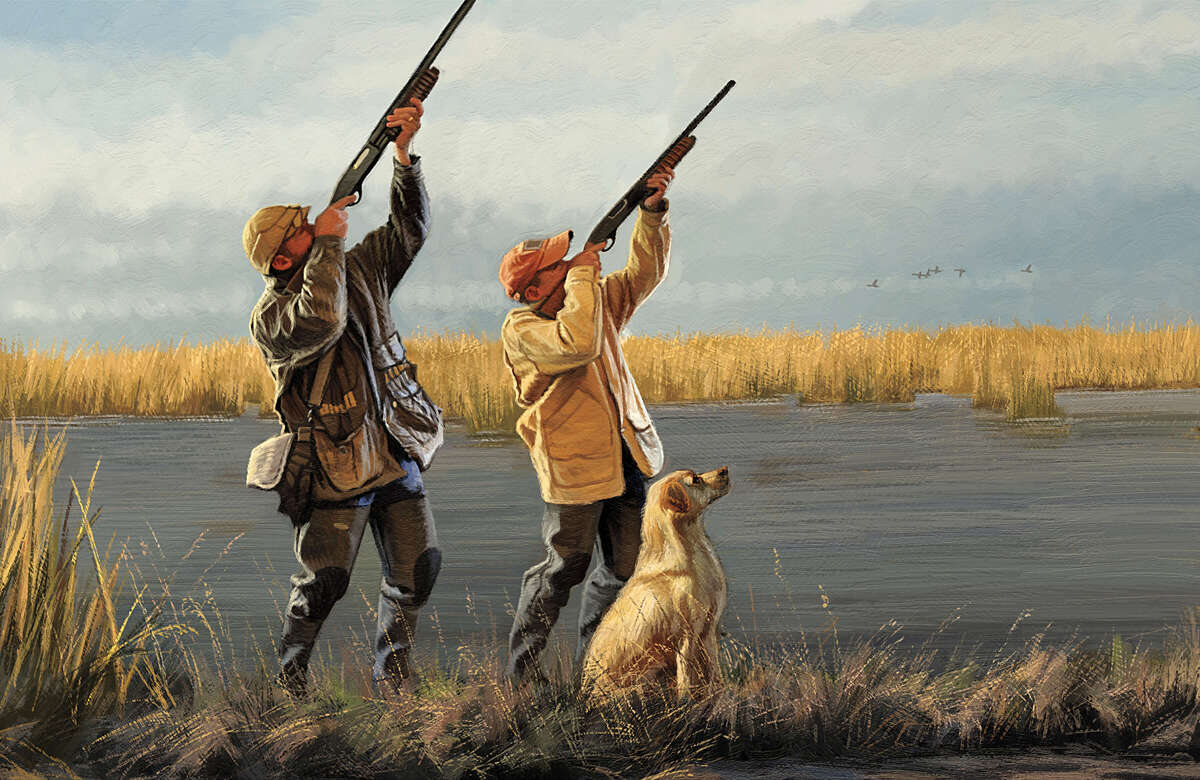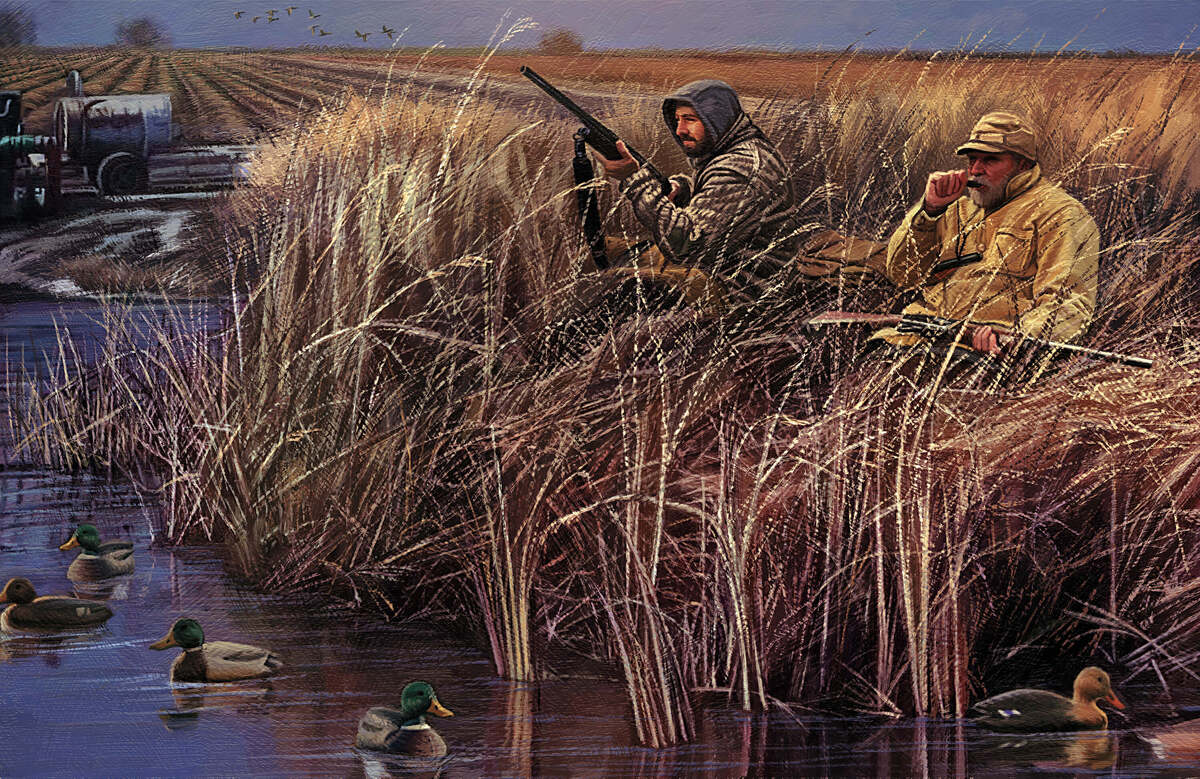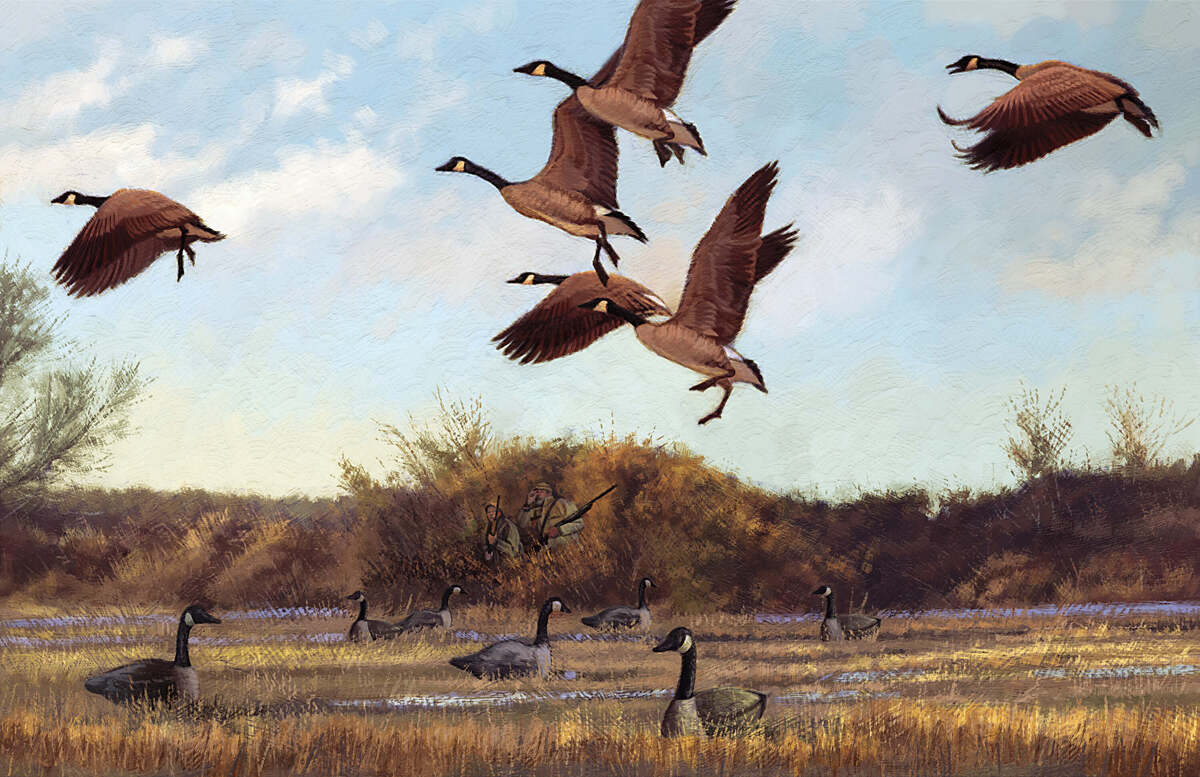Holiday Hunts
Special days become even more memorable when you spend them in a duck blind with family and friends
Special days become even more memorable when you spend them in a duck blind with family and friends

From the DU Magazine Archives
By Doug Larsen

For us northern hunters, Halloween has always been as much a part of our duck season as Thanksgiving and Christmas are to hunters in the South. For us, duck season overlaps the holiday, and most years those two things don’t have a lot to do with each other, save for the fact that on November 1st you go hunting with a lot of little candy bars in your blind bag. But not so many years ago a strong cold front swept across the plains on All Hallows’ Eve. I had been watching the weather for days, enduring Indian summer and seeing nothing more than silhouettes of wood ducks in the first minutes of light. Halloween fell on a Friday that year, and as early as Tuesday the local weather personalities were quite excited about the forecast. Something was brewing.
Halloween morning offered the usual holiday activities. Driving through our small town I saw costumed children waiting at bus stops. I bought a gallon of paint from a witch at the hardware store and later a hamburger from a pirate. By late afternoon, the temperature was dropping and dense clouds loomed as children came to our porch to trick or treat in all manner of costumes. The princess looked rather bulky in a pink gown worn over her snowsuit, and the cowboy that accompanied her wore winter boots and mittens. Others visited in rubber monster masks and parkas, and at dusk I watched small groups of children scurry along wet streets as wet leaves piled across sidewalks and gutters. Cold rain glowed in vertical showers under the streetlights as children zigzagged across lawns with bags and plastic pumpkins and pillowcases filled with sugared booty. Parents ambled along with phones or flashlights, waving from underneath hoods or umbrellas.
Not long after the last of the merrymakers left my porch, I was off to the local high school, where a football game was being contested under deteriorating conditions. Climbing the bleachers, I was greeted by neighbors, and the beginnings of snow fell as a wet glop and melted on coats and Astroturf.
Soon I was joined by my veterinarian friend, already wearing his camouflage parka. I asked him if he had gone begging for candy dressed as a duck hunter. Wiping the moisture from his glasses, he simply replied, “What time are we leaving in the morning?”
The wind blew harder, the huge flag crackled at the end of the field, and the doctor and I made our plans. By the middle of the fourth quarter, a hometown victory had been secured, and I retreated to the parking lot, noting duck boats in several truck beds. The snow was sticking now, and my wipers cleared it from the windshield as I returned home.
Not many hours later I awoke to heavy snow. There were already several inches in the streets. It was still coming down as the doctor and I rowed our boat against the wind and up a long pothole flanked by high ground. From the air this pothole looks like a hot dog in a bun of foothills. We pressed to get to the far north end, to an area protected from the gale. We flushed several dozen geese and some ducks as we plodded ahead and set decoys. Based on the lack of feeling in my hands, I estimated that the temperature was well below freezing, with wind chill making things feel even more severe.
We huddled in the dark boat and, our backs to the wind and snow, waited for a sluggish dawn. There was little doubt that we would see ducks, but neither of us was prepared for the spectacle of that morning. In half-light we had diving ducks on us by the hundreds—bluebills and redheads came straight up the length of the pond and dumped in with abandon. On top of them mallards circled and decoyed.
At times the ducks were so dense over the decoys that they would cross flight paths and flare just feet above our heads. We ignored flights of green-winged teal, as many as 40 or 50 to a flock, such was the opportunity for bigger ducks. With freezing fingers we loaded and reloaded and shot ducks hanging straight downwind at short yardage. They floated to the other end of the pond and gathered belly-up where a shelf of ice had formed. It was over in minutes, and we rowed out to gather our decoys and the last few ducks. Squinting through snow-speckled glasses, the doctor laughed and exclaimed, “I didn’t even have time to eat my little candy bars!”
By Michael Furtman

“Mike! Get up or I’ll go hunt by myself!” Dad said.
He had poked me twice already. He was dressed and getting impatient. But Lordy it was cold in that tent. Crawling out of my toasty sleeping bag was going to be torture. As much as I loved to hunt with my dad, I was beginning to regret asking him to take me on this late-season duck hunt.
It was November 11, 1970, five days before the end of the duck season. The weather was typical for Minnesota—cold, gray, windy, with a skiff of snow on the ground. Deer season was in full swing, but Dad and I would rather hunt ducks, so the rifles were at home and the Model 12s were in the Chevy.
I had this day off from high school, and Dad took the day off work. The day before, I had run home after school to get the hunting gear ready. As soon as Dad got home from work, and after Mom fed us, we drove two hours to a spot in the Chippewa National Forest that we reached via a good two-track road the station wagon could handle. We set up the tent in the dark on a rise between two lakes.
“We’re going to a great spot,” Dad had said during the drive. “It’s not like nobody else knows about it, but during the week I’m pretty sure we’ll have it to ourselves. There’s a small lake to the south and a big lake to the north. The ducks trade back and forth between them. And if there are hunters out on the big water—and this being a holiday, there probably will be—the ducks like to drop into these little lakes where they think they’re safe. But tomorrow, they’ll be wrong,” he chuckled.
And, of course, he was right. We set up on the north shore of the south lake with the wind at our backs. Before shooting time, we could hear wings above, and after shooting time arrived we heard the distant, muffled shots of hunters on the big lake. Those shots pushed the ducks to us—fat greenheads and chunky bluebills. Snooks, our Lab, was soon wet and happy. Halfway to filling our limits (the bag limit then was four each), things slowed down. We started chatting.
“You know why you have today off, don’t you?” Dad asked.
“Yeah. It’s a holiday.”
“Not just any holiday, son. It’s Veterans Day. Today we remember those who fought for us. Like my younger brothers Jim and Don. Both were in World War Two.”
Dad hadn’t served. During his Army physical, they said he had a heart murmur, so they wouldn’t take him. Funny thing is, he was the fittest man I’ve ever known, and not too many years before he had been a professional boxer. But the heart problem, and the fact that he already had three kids, disqualified him from service. Instead, he went to work at the shipyards in Superior, Wisconsin, where his welding skill helped crank out Victory ships that were used during the war.
Dad’s explanation was put on pause when the bluebills came from the south. They flew low and fast, barely clearing the trees on the far end, and raced toward us. Without even pausing to examine the decoys, they set their wings and whistled straight in. I took two, and so did Dad. We sent Snooks, and then we were done.
As we packed our gear, I rustled up some courage. I knew Uncle Jim well. He’d been a medic during the war and was a frequent visitor at our house (he loved my mom’s cooking). But I’d never met Uncle Don. He died before I was born. Dad rarely mentioned him.
“Did Uncle Don die in the war?”
“No, son. He fought in North Africa and even survived the battle of Anzio in Italy. He died after the war.”
“How?” I asked.
There was a very long pause. Dad took a deep breath before answering. “When Don got home, he wasn’t the same. Nervous. Reckless. Drank hard. You kids today would say he was messed up. I tried to help. He survived combat, but the war killed him anyway.”
Dad turned away. I guess he’d gotten something in his eyes because I could see he was wiping them with the back of his hand.
“I wish I could have known him,” I said.
“Me too. But we can honor him. Load your shotgun,” Dad said.
I did, he did, and we walked back down to the shore.
“It’s not a 21-gun salute, Mike, but we can give Don six rounds of duck loads into the sky! Just don’t hit any ducks. We’ve got our limits,” he smiled.
The lake echoed in his honor.
By Chris Madson

This is nothing like the way he taught me, I thought as Dad and I lay down at the water’s edge, arranged the burlap decoy bags over ourselves, and covered them with the smartweed and slough grass we’d pulled up nearby.
The waterfowling I’d grown up with on the lower Illinois River was a formal affair—big boats, big blinds, big water, and lots of competition. Dad had instructed me in the fine art. He was an expert in the game, but so were most of the other waterfowlers in neighboring blinds, and the ducks had already run half the gauntlet down the flyway by the time we had a look at them. Some days we had our chances. Some days we didn’t.
I’d almost given up duck hunting by the time I moved to the high plains of the Central Flyway, but Dad insisted on sending four dozen Flambeau floaters along with me—as a reminder, he said. Obliged by his generosity, I hauled them out to a public marsh 20 miles west of town with low expectations and quickly discovered that waterfowl in that part of the world were far less challenging to hunt than the birds along the Illinois. Soon thereafter, a friend and I connected with a local farmer who, in exchange for help with the milo harvest, let us hunt one of the tailwater pits on his irrigated fields.
I’ll never know for certain what was so special about that little puddle. Barely a quarter of an acre, it was less than a hundred yards from the section road and barely three feet deep. There were hundreds of others like it scattered across that landscape, but the ducks sought this one out and would not leave it alone. During cold fronts and bluebird days alike, until that scrap of wetland froze up, teal, wigeon, gadwalls, mallards, and the occasional pintail were attracted to it like beggar-ticks to a setter’s ear.
That Thanksgiving, the center of gravity in our family had shifted. For a dozen years, I’d gone back to Illinois for the holiday, first by myself, then with the woman who became my wife, then both of us with one or two towheaded urchins in tow. When my youngest sister married and left home, my parents suggested a major change—they asked if it would be alright if they came to Kansas to celebrate the holiday with us. Kathy said we’d be overjoyed to have them, and I told Dad to bring a shotgun and a pair of waders.
All of which had brought the two of us to the edge of the tailwater pit on Thanksgiving morning. We rose at six o’clock, and within an hour we were pulling off the gravel onto the corner of the center pivot. A cold front had blown through the previous day, and the first gray light of the morning struggled through a low overcast. Blowing from the northwest and ruffling the surface of the puddle, the wind hurried on its way to Texas.
As we got into our waders and shouldered the decoy bags, I could see Dad contemplating the humble patch of water with a bemused look on his face, keeping his skepticism to himself. Fifteen minutes later, we’d set the blocks and finished our impromptu layout blinds. I barely had time to adjust the decoy bag I was using to prop up my head when I heard a single mallard hen somewhere overhead. Dad answered with three low quacks, and a flock of 10 or 12 materialized 200 yards downwind of the spread, high but swinging back in our direction. The birds beat their way into the wind, then set their wings and dropped almost vertically toward the decoys.
“You call it,” Dad whispered. It was a shock, and it suddenly struck me that another seismic change had just occurred. My father was my guest on this hunt, not the other way around, and like any polite guest, he had ceded control of the moment to his host. This was a matter of etiquette between two equals. I contemplated that—two equals. The times we’d spent together in the marsh rushed past me, the things I’d learned, the gifts he’d given me. And this moment was not the least of those.
I waited until the two lead hens started to backpedal, found the pistol grip of my Model 12, and said, “Take ’em.”
They were maybe 20 yards out and hooked over the decoys when we sat up. I picked a drake on the right and folded it. I heard a splash on Dad’s side and turned to see his second drake floating belly-up. The next hour brought more of the same. With four more greenheads in the grass behind us, Dad sat up and looked at me with a shake of his head.
“I never would have believed it,” he said as he looked out over the puddle. “What a perfect morning.” Then, as he unloaded his gun, he turned back to me with a wry grin and, in homage to the occasion, added, “Let us give thanks.”
To which I could only reply, “Amen.”
By Tom Fulgham

A few days before my ninth Christmas, my father took me on my first goose hunt. After setting papier mâché decoys in a pasture by the lake, we squeezed into a cedar-brushed blind and ate hard-boiled eggs while waiting for shooting time. Soon after sunrise, a dozen Canadas lollygagged our way. When my father’s calling reached the flock, the birds began to glide. Dad smiled, the trace of a twinkle in his eyes.
After circling once, the flock lit in the decoys. Dad nodded, and as I stood, some of the geese jumped. To a kid who had shot only a handful of ducks, the geese seemed enormous. I lifted the 20-gauge side-by-side, borrowed from the town barber, and picked out a late riser. To my astonishment, the bird folded when I shot. I was stunned, frozen in place by the intensity of the last few moments. The thought of firing the second barrel at another goose never entered my mind. Dad had doubled, and as he took one of the birds from our Lab, he turned and said, “Nice job, son! Now you’re a goose hunter.”
On the ride home, Dad asked, “How come you only shot once?”
“I don’t know,” I replied. “All I know is my heart was pounding when those geese came in. Now I just want to do it again.”
“I know,” he said. “Me too.”
Two days after Christmas more than five decades later, my 33-year-old son and I sat in an Arkansas pit blind. Christmas with children and grandchildren had been wonderful, full of laughter and happiness, and hunting with Steven on this bright winter’s day would make the holidays even more special.
Just after sunrise, a lone greenhead swung the decoys before passing over my side of the pit. I missed, increased my lead, and nothing happened, not even a click. The bolt assembly link had snapped. I was out of commission.
“No worries,” Steven said. “We’ll take turns. One calls, the other shoots.”
When two mallards appeared, I blew a soft five-note and they locked up. Steven shot the drake hanging over the decoys. My turn came quickly as another pair crossed the far end of the field. Steven hit them hard with the call, had them, lost them, and called them back again. Soon they were over the rig, and I rolled out the drake with my son’s gun.
Over the next two hours, we each limited on mallards. Taking turns calling and shooting offered an opportunity for me to appreciate more fully how proficient a duck hunter my son had become. My father would have liked this hunt, I thought.
The specklebellies had been aloof that morning, so I moved two of our decoys closer to the pit. Specks have an uncanny ability to pinpoint calling and will sometimes slip away if the sound doesn’t match the location of the decoys. Moving the pair worked. A single homed in on my calling and, without circling, cupped its wings and was over the pair of decoys when Steven fired. Another single soon followed suit. Steven called aggressively, and the speck was on a string, locked on the two decoys and answering rapidly. When I stood, the goose was mere feet over my head.
“You wore him out with that speck call,” I said.
I glanced over at my son, and he was smiling, the trace of a twinkle in his eye. “A late Christmas gift for you,” he replied.
This past season, on the day before Christmas Eve, Steven brought along my five-year-old granddaughter, Lila, for the first time. I had shot two specks that morning and had left the decoys out. Now midday, specks and snows bombed the neighbor’s field as we walked to the A-frame. The blind straddled a small, water-filled ditch. Lila sat in my lap while Steven loaded up and began calling.
In no time, three specks were pumping their wings over the landing hole 15 yards away. I lifted Lila so she could see over the brush. I was not sure if she was ready for what was about to happen.
At the sight of the geese, she gasped and simply said, “Wow.” After Steven shot one of the geese, she exclaimed, “Dad got one!”
Minutes later, Steven called in a single, and I lifted Lila again. This time she said, “Good shot, Dad!”
“Nice job, Lila,” I said. “Now you’re a goose hunter.”
She looked up at me and smiled, her eyes gleaming. I flashed back to that heart-pounding moment with my father so many years before. Four generations, I thought. The ember that glowed within my father was still burning inside me, my son, and now my granddaughter. I hoped it would glow brightly for many Christmases to come.
Ducks Unlimited uses cookies to enhance your browsing experience, optimize site functionality, analyze traffic, and deliver personalized advertising through third parties. By continuing to use this site, you agree to our use of cookies. View Privacy Policy